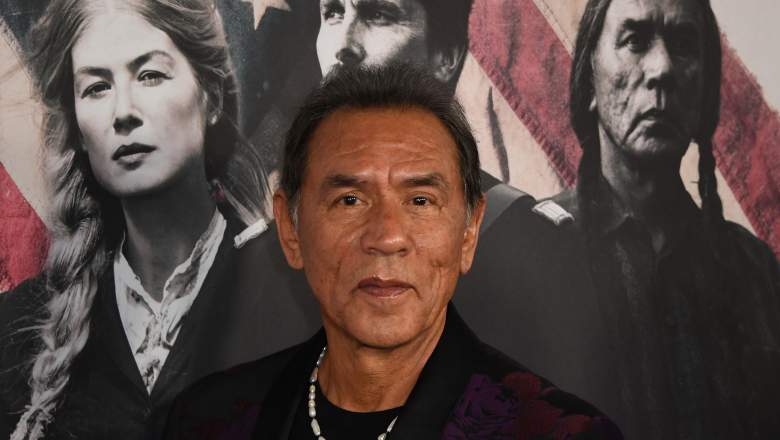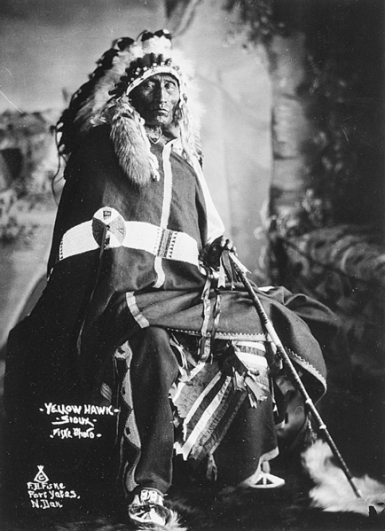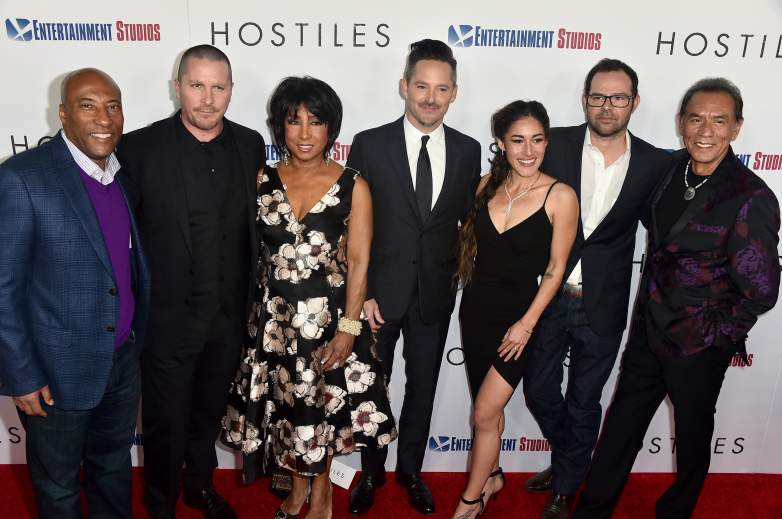
Yellow Hawk is the dignified, wise, and dying chief of the Cheyenne tribe who is being escorted home to Montana by a conflicted, bigoted cavalry soldier played by Christian Bale in the Hollywood movie, Hostiles. (Warning: There are some spoilers ahead.)
Played by the Cherokee actor Wes Studi, Yellow Hawk, family-focused and deeply spiritual, forges a slow bond of mutual respect with Bale’s character Joseph Blocker. Yellow Hawk helps Blocker perceive the humanity in his once mortal foe. It is undeniable, and, throughout the course of the movie, the men will fight alongside each other.
In one moving scene, the two clutch hands as Bale comes to terms with what he’s done in past massacres, carrying that knowledge with a haunted weariness as he looks the dying chief in the eye. Eventually, he will fight to the near death to protect Yellow Hawk’s right to be buried in his own lands and, the ending implies, he will become the caretaker, with a frontier woman, of the grandson who carries the old chief’s bloodline.
It’s a moving portrayal by both men, and it has a lot of moviegoers wondering: Was Chief Yellow Hawk real?
There was an Indian Chief named Yellow Hawk in real life, but he was a member of the Cheyenne River Sioux people, not the Northern Cheyenne of Montana, and he did not die in the mountains after a trip with a cavalry soldier. In other words, the Yellow Hawk in Hostiles is a fictionalized character.

Wikimedia CommonsChief Yellow Hawk of the Cheyenne River Sioux.
However, the story of the real Chief Yellow Hawk is a fascinating one.
According to the Cheyenne River Sioux website, geographically, the Lakota to which he belonged “are the most western of the groups and there are seven distinct bands. Four of the Lakota bands (Minnicoujou, Itazipco, Siha Sapa, and Oohenumpa) are located on the land known as the Cheyenne River Indian Reservation.”
The Northern Cheyenne tribe, which is located in Montana – the state where the movie Yellow Hawk heads to be buried – is a different Indian nation.
Here are some of the details that are known about the real Chief Yellow Hawk of the Cheyenne River Sioux: He visited Washington D.C. in 1867 (Hostiles the movie is set around 1892). His wife, Julia Deloria, has an interesting background. By some accounts, she was the daughter of a Frenchman and an Indian woman. By other accounts, she was “a white woman rescued as a baby from a destroyed village by the Yellow Hawk family and raised by them,” according to the site American-tribes.com. They had a son named Solomon Yellow Hawk.
In the movie, the fictional Yellow Hawk has a son named Black Hawk, who is played by the actor Adam Beach. There was a real Chief Black Hawk, but he was a leader of the Sauk, Fox, Kickapoo and Ho-chunk people and fought in the Black Hawk War.
Who were the most famous real chiefs of the Cheyenne tribe? They include Black Kettle, Dull Knife, Little Wolf, and Morning Star. But Yellow Hawk does not appear on such lists. There were Cheyenne chiefs named Yellow Horse, Yellow Hair, and Yellow Nose.
One of the best known real Cheyenne Chiefs, Black Kettle, “was known as a peacemaker who accepted numerous treaties to protect his people. He survived the Sand Creek Massacre in 1864.” Dull Knife “reluctantly led his people into a war he suspected they could never win” after the massacre.

Byron Allen, Christian Bale, Carolyn Folks, Scott Cooper, Q’Orianka Kilchar, Rory Cochran and Wes Studi attends the premiere of Entertainment Studios Motion Pictures’ “Hostiles” at Samuel Goldwyn Theater on December 14, 2017 in Beverly Hills, California.
Wes Studi, 70, discussed portraying Chief Yellow Hawk to Indian Country Today. “I think Hostiles is just another step along the way to actually getting a real Native American perspective,” he said in the interview, adding that the film tried to be authentic in its portrayal of the Cheyenne people.
“I think the entire film absolutely works well because everyone was very open the idea and concept to maintain the authenticity with cultural consultants and the Cheyenne people— as you should when you are telling a story about them— it really is as simple as that,” Studi told Indian Country Today.